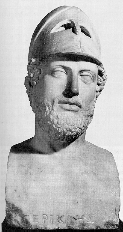The Golden Age of
Greece was short lived. Athens and Sparta were both
powerful poli, and each wanted to spread  their
way of life. Sparta attacked Athens in
431BC, beginning the brutal
Pelloponesian War. It lasted 27 years.
their
way of life. Sparta attacked Athens in
431BC, beginning the brutal
Pelloponesian War. It lasted 27 years.
One out four people in
Athens died shortly after the war began, but not because
they were defeated in battle. A plague, or great
sickness, spread through Athens. When the war started,
people from around the city crowded into Athens. The
cramped and dirty living conditions were an easy target
for disease. Sickness claimed the life of Pericles, the
leader of Athens.
Once Pericles died, the
people began to listen to demagogues. Demagogues were bad
leaders who appealed to people's emotions rather than
logic. Sparta eventually defeated Athens by building a
blockade around the walls of the city. The people of
Athens could not leave to get supplies or food from the
countryside. Faced with starvation, Athens surrendered to
Sparta in 404BC.
Athens' Golden Age was
now long gone. Great thinkers and teachers lived in
Athens during and after the Pelloponesian War, and
self-rule eventually returned to the city, but the era of
support for new ideas and the spirit of democracy had
passed.
 their
way of life. Sparta attacked Athens in
431BC, beginning the brutal
Pelloponesian War. It lasted 27 years.
their
way of life. Sparta attacked Athens in
431BC, beginning the brutal
Pelloponesian War. It lasted 27 years.
